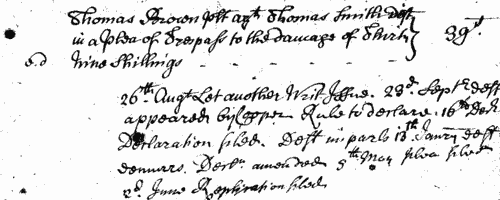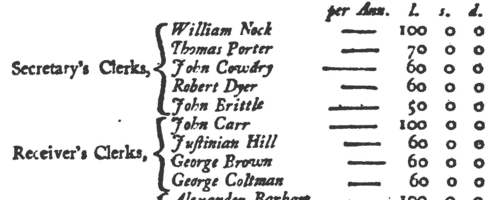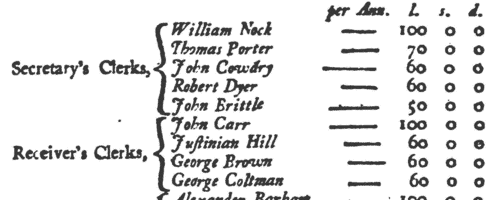Add this eBook to your basket to receive access to all 975 records. Our indexes include entries for the spelling street. In the period you have requested, we have the following 975 records (displaying 151 to 160): These sample scans are from the original record. You will get scans of the full pages or articles where the surname you searched for has been found. Your web browser may prevent the sample windows from opening; in this case please change your browser settings to allow pop-up windows from this site.  Masters and Apprentices
(1738) Masters and Apprentices
(1738)
Apprenticeship indentures and clerks' articles were subject to a 6d or 12d per pound stamp duty: the registers of the payments usually give the master's trade, address, and occupation, and the apprentice's father's name and address, as well as details of the date and length of the apprenticeship. 1 January to 7 October 1738 | Sample scan, click to enlarge

| East Cheshire plaintiffs and defendants
(1739)
Macclesfield Hundred court, held at Macclesfield every fourth Monday for the trial of civil causes, had jurisdiction over Bredbury, Brinnington, Bramhall, Fulshaw, Cheadle, Handforth, Dukinfield, Etchells, Hyde, Northenden, Romiley, Stockport, Werneth, Mottram (in Longdendale), Nether Alderley, Over Alderley, Birtles, Bollin Fee, Newton by Butley, Capesthorne, Chelford, Old Withington, Chorley, Eaton, Fallibroome, Henbury, Marton, Mottram St Andrew, Worth, Woodford, Pownall Fee, Snelson, Siddington, Somerford Booths, Lower Withington and Great Warford, all in east Cheshire. The sample scan is taken from 29 July 1734: as in this case, whenever an action continued, through a series of writs or actual appearances, through subsequent sittings of the court, these were all entered on the same page, so that each is the full record of the particular action through to its conclusion. Some actions will have been settled 'at the court door', in which case nothing more is recorded than the names of plaintiff and defendant, the nature and value of the action. Addresses and occupations are not usually given for plaintiff or defendant, but are stated for bail sureties. This index covers plaintiffs, defendants and bail sureties, but not court officials or attorneys. This index is for the court held on 2 April 1739 | Sample scan, click to enlarge

| Establishment of the Duke
(1741)
'A General List, or Catalogue, Of all the Offices and Officers Employ'd In the several Branches of his Majesty's Government Ecclesiastical, Civil, Military, &c. In South-Britain, or England' gives the names (and often the annual salaries) of the government functionaries, civil servants, churchmen and military, systematically arranged section by section. Section 90 lists the establishment of his Royal Highness the Duke, from the governor of the household down to the grooms' boys and the gamekeeper. | Sample scan, click to enlarge

|  Masters and Apprentices
(1741) Masters and Apprentices
(1741)
Apprenticeship indentures and clerks' articles were subject to a 6d or 12d per pound stamp duty: the registers of the payments usually give the master's trade, address, and occupation, and the apprentice's father's name and address, as well as details of the date and length of the apprenticeship. 1 January to 31 December 1741 | Sample scan, click to enlarge

| Yeomen of the Guard
(1741)
'A General List, or Catalogue, Of all the Offices and Officers Employ'd In the several Branches of his Majesty's Government Ecclesiastical, Civil, Military, &c. In South-Britain, or England' gives the names (and often the annual salaries) of the government functionaries, civil servants, churchmen and military, systematically arranged section by section. Section 85 lists the Yeomen of his Majesty's Guards, and their officers, including the yeomen hangers and bed-goers. | Sample scan, click to enlarge

|  Masters and Apprentices
(1742) Masters and Apprentices
(1742)
Apprenticeship indentures and clerks' articles were subject to a 6d or 12d per pound stamp duty: the registers of the payments usually give the master's trade, address, and occupation, and the apprentice's father's name and address, as well as details of the date and length of the apprenticeship. 1 January to 31 December 1742 | Sample scan, click to enlarge

|  Masters and Apprentices
(1743) Masters and Apprentices
(1743)
Apprenticeship indentures and clerks' articles were subject to a 6d or 12d per pound stamp duty: the registers of the payments usually give the master's trade, address, and occupation, and the apprentice's father's name and address, as well as details of the date and length of the apprenticeship. 13 June to 31 December 1743 | Sample scan, click to enlarge

|  Masters and Apprentices
(1744) Masters and Apprentices
(1744)
Apprenticeship indentures and clerks' articles were subject to a 6d or 12d per pound stamp duty: the registers of the payments usually give the master's trade, address, and occupation, and the apprentice's father's name and address, as well as details of the date and length of the apprenticeship. | Sample scan, click to enlarge

|  Apprentices registered at Dorchester in Dorset
(1741-1745) Apprentices registered at Dorchester in Dorset
(1741-1745)
Apprenticeship indentures and clerks' articles were subject to a 6d or 12d per pound stamp duty: the registers of the payments usually give the master's trade, address, and occupation, and the apprentice's father's name and address, as well as details of the date and length of the apprenticeship. There are central registers for collections of the stamp duty in London, as well as returns from collectors in the provinces. These collectors generally received duty just from their own county, but sometimes from further afield. (The sample entry shown on this scan is taken from a Norfolk return) | Sample scan, click to enlarge

|  Apprentices registered at Southampton in Hampshire
(1741-1745) Apprentices registered at Southampton in Hampshire
(1741-1745)
Apprenticeship indentures and clerks' articles were subject to a 6d or 12d per pound stamp duty: the registers of the payments usually give the master's trade, address, and occupation, and the apprentice's father's name and address, as well as details of the date and length of the apprenticeship. There are central registers for collections of the stamp duty in London, as well as returns from collectors in the provinces. These collectors generally received duty just from their own county, but sometimes from further afield. (The sample entry shown on this scan is taken from a Norfolk return) | Sample scan, click to enlarge

|
Research your ancestry, family history, genealogy and one-name study by direct access to original records and archives indexed by surname.
|












